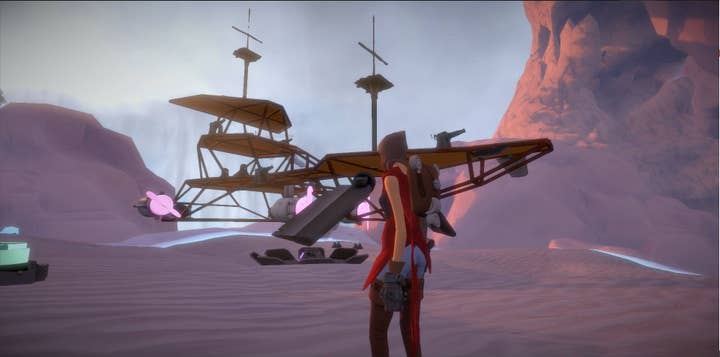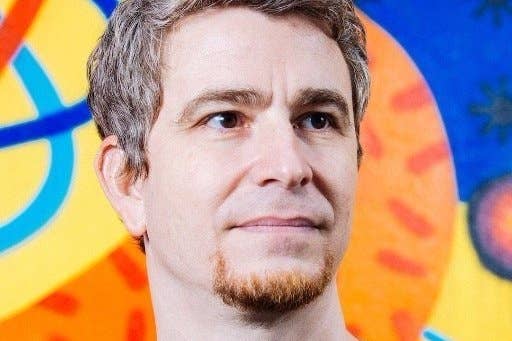Bossa returns to multiplayer roots
Henrique Olifiers explains why Surgeon Simulator and I Am Bread don't represent the studio's future, and why the studio took VC money for Worlds Adrift
Don't expect Bossa Studios' future output to look much like its recent past. The developer of Surgeon Simulator 2013 and I Am Bread is adopting a more multiplayer-centric focus beginning with its in-development sandbox MMO Worlds Adrift.
Speaking with GamesIndustry.biz yesterday, Bossa co-founder Henrique Olifiers said the recent announcement of $1.35 million in venture capital funding for the studio was quite deliberately tied to Worlds Adrift.
"Our specific strategy is that we only talk about multiplayer going forward," Olifiers said. "It's kind of going back to our roots in believing that every game experience is better when you share that with friends."
"This is why when we talk about investment from London Venture Partners in Bossa, we frame it within Worlds Adrift: Because it is the representation of what we will be doing from now on."
He added, "Worlds Adrift is going back to those roots in that we believe that if given the right tools and freedom and context, players can extract much more fun out of a game than is currently possible with the type of games they have at their disposal right now. This is why when we talk about investment from London Venture Partners in Bossa, we frame it within Worlds Adrift: Because it is the representation of what we will be doing from now on. We didn't want to tie that investment too much with Surgeon Simulator or I Am Bread. It's not because we won't continue to support those games; we love them and still have a lot of things we will do with them. It's because they don't represent where we want to take the company forward in our new games."
That switch in focus is bringing the company full circle in a couple ways. One of Olifiers' motivations to form Bossa in the first place was to expand and explore multiplayer gaming in ways that hadn't been considered. That drive could be seen in the company's debut title, Monstermind, the first real-time multiplayer game to launch on Facebook. There's also a bit of history repeating in the company raising outside funding to pursue that multiplayer vision. As Monstermind was launching in 2011--and less than a year after Bossa's founding--the company agreed to an acquisition by Shine, a British production company with a library of TV properties including Masterchef, The Biggest Loser, and the BBC series Merlin.
"It was very much a vision we shared that social platforms would develop into the place to go for both gaming and linear content, which was what Shine was very good at," Olifiers explained. "We were thinking about what we could do together to create a new format, if you wish, that was compatible with social gaming platforms. But as you probably know, the ecosystem changed a lot since we started with our first game, Monstermind."
Even though the Facebook gaming market had turned south, Bossa pressed on and created a game for the platform based on Merlin. It was Olifiers' one regret about the deal with Shine, postponing the pivot away from Facebook because the team was "starstruck" about working with a big IP like Merlin. He characterized it as an experiment in combining Bossa's game development expertise with Shine's IP rather than a template for the strategy going forward, but that particular avenue of experimentation would be a dead end. Despite that, Olifiers said there was little friction from Shine about what role the game studio would have in the business' bigger picture.
"When it became clear our original plan wouldn't work, we were given free reign over what to do next," he said. "And our choice was that we would try to develop our strategy on another platform. We'd go for PC, which was something we could see flourish in the long-term, and we can try to do something different in that space based on creativity and making titles that don't quite fit the mold."

That approach clearly worked, but in December of 2014, Shine merged with another TV production company, Endemol. As management shifted and priorities changed, Bossa found itself a poor fit for the new direction of the Endemol Shine Group.
"We sat together and discussed with them what we wanted to do," Olifiers said. "They discussed with us what they wanted to do, and we saw the parallels weren't there... There are probably few other companies in the world that are as savvy as Endemol in leveraging their own properties and IPs, in taking them global and making them successful. They were very driven by that. And we were very driven to experimenting and trying new formats and new things. We just didn't see much of a parallel on the long-term."
Olifiers recounts it as a very friendly conversation between parties that just didn't have much in common anymore, and it led to Bossa's co-founders buying back the company's independence from Endemol Shine last summer.
At the time, they had no intention to sell any part of the company again. Surgeon Simulator and I Am Bread had not only given the company a pair of lucrative hits to make it financially independent, they had proven out the company's creative potential and game jam-centric development strategy.
"We were very happy to be as we were," Olifiers said, "And we decided to take our own way because we were profitable, and masters of our own destiny, if you wish. At some point in the company's lifecycle, we decided that we needed a strong advisory board, and we brought [Games Workshop co-founder] Ian Livingstone, [then-Mastertronic CEO] Andy Payne, and [Criterion Software] founder David Lau-Kee onto the board, so we could test our strategy with people much more experienced than we are."
Lau-Kee also happens to be a general partner at London Venture Partners, along with former Atari CEO David Gardner and industry advisor Paul Heydon. As individuals or as LVP, the trio has made early investments in Supercell, Playfish, Unity, NaturalMotion, Applifier, Radient Entertainment, and more.
"Their track record as investors in games is probably unmatched in the world," Olifiers said. "And there's a reason for that. It's not coincidence... I honestly believe they see in Bossa the same things I do, which is how we are able to employ technology, game design, and ideas in a creative framework that's kind of different from what's out there, and how much potential that can have in the long run when we embark on projects like Worlds Adrift."
"One of the sparks that originated Worlds Adrift was our realization that not only were we frustrated by the state of online games in general, but especially MMOs."
Olifiers said the $1.35 million investment in Bossa is LVP's largest to date. And even if the money isn't jaw-dropping in terms of game development budgets, it was far from the only reason for Bossa's founders to part with a piece of the successful company they had just bought back last year.
"Yes, the money is important--although in AAA terms it doesn't have enough zeroes there--but for a game like Worlds Adrift, which we've been working on for two years, this is probably 50% of what we will spend on the title. We run a very tight ship. We still have very few people working on projects. This money goes far. But beyond that is the fact of who they are."
With the help of that advisory board, Olifiers is hoping Worlds Adrift can realize nothing less than the revitalization of a genre.
"One of the sparks that originated Worlds Adrift was our realization that not only were we frustrated by the state of online games in general, but especially MMOs," he said. "It came about from the perspective that if you remember playing tabletop [RPGs] like D&D or GURPS, you sat down with your friends and a world unraveled in your head. You went through these incredible adventures that you shared with people who mattered to you."
It was natural that people would try to recreate those experiences on computer, and Olifiers said those efforts were productive for a time. MUDs recreated some of the key social aspects of those pen-and-paper RPGs, and games like Ultima Online, Runescape, and World of Warcraft pointed to future possibilities.
"And all of a sudden that stopped," Olifiers said. "With very few exceptions like EVE and World of Tanks, everything else out there is very much an iteration of something that's been going on quite a while now. And we don't think that captures the freedom of expression and interrelationship between friends that we got back at the start, with pen and paper. This is one of the things that drove us to creating Bossa in the first place."

